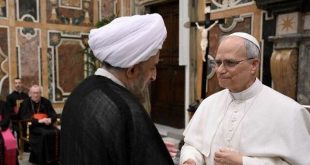All faith communities should be involved in writing Universal Declaration of Human Rights. The role and opinions of Muslims in Universal Declaration of Human Rights should be propounded and compiled in the Islamic Conference.”
Dr. Sayyid Ali Taleqani the eminent professor of Hawza Ilmiyya in Mashhad, Iran in the assembly of jurisprudence and human rights in the center of Islamic researches of Ayatollah Ashrafi Shahroudi in Mashhad – by presenting a subject about the designating the meaning and the realm of Jurisprudence and human rights – stated, “the issue of Jurisprudence and Human rights is more general than the issue of human rights’ jurisprudence. The Jurisprudence of human rights means jurisprudential discussions concerning what is deemed as human rights. However at the moment we do not have a compiled Jurisprudence of human rights major. Human rights is a subcategory of laws and the Philosophy of human rights is a subcategory of the Philosophy of laws.”
Dr. Taleqani in addition to expressing the meaning of human rights said, “Human rights is situated in jurisprudential maxims (‘Ilm Al-Fiqh) provided that it enters into the sphere of the man’s duties such as the concept of the justice that has been transferred to the man by God. Even in our point of view, the efficiency of Universal Declaration of Human Rights has some problems due to having no principles such as Imāmat.”
In continue, he expounded on four unanimous subjects in human rights and he also provided some explanations about the disagreed terms of Universal Declaration of Human Rights.
On the issue of the confronting the world of Islam with human rights, the eminent professor of seminary of Mashhad affirmed, “In recent decades, the Shia’s approach to the human rights has been optimistic and has considered it positive. The important instance of this consideration is the entry of ‘Hoghūgh Al-Insān’ in encyclopedia of Islamic jurisprudence by Mr. Hashemi Shahroudi. The main point, however, is the difference between the human rights and Universal Declaration of Human Rights. The text of Universal Declaration of Human Rights has been written affected by emotions and political support and pressure of secular and liberal groups and which sometimes in conflict with jurisprudence.”
He declared, “Now we should notice whether there is something called ‘human rights’ in Islamic practical laws. Does the wise governing which is similar to Imāmat ever fit into the human rights or not? Some individuals like Sheikh Muhammad Hussein Esfahāni have some arguments, but these cases should be propounded and discussed in jurisprudence of human rights.
He also pointed out that not all communities accept the human rights. Six large groups are reckoned as its dissenters. Marxian, non-liberal feminists, the adherents of MacIntyre who are followers of virtue and ethic’s school of thoughts, fascists and almost all religions including the Israeli Fundamentalist Jews have certain disagreements with it.”
In expressing the solution for the issue of Universal Declaration of Human Rights, He emphasized, “some of the solutions are cognitive and some other are applied to implementation of the declaration. Because of some pressures, this declaration has had political and social enforcement which in my opinion, Islam does not accept this coercion. Sometimes our task is reasoning in which we should argue and discuss and ask for answers in such situation, but the best solution is propounding these issues in the Islamic Conference. All faith communities should be involved in writing Universal Declaration of Human Rights. The role and opinions of Muslims in Universal Declaration of Human Rights should be propounded and compiled in the Islamic Conference.”
 Ijtihad Network Being Wise and Faithful Muslim in the Contemporary World
Ijtihad Network Being Wise and Faithful Muslim in the Contemporary World
